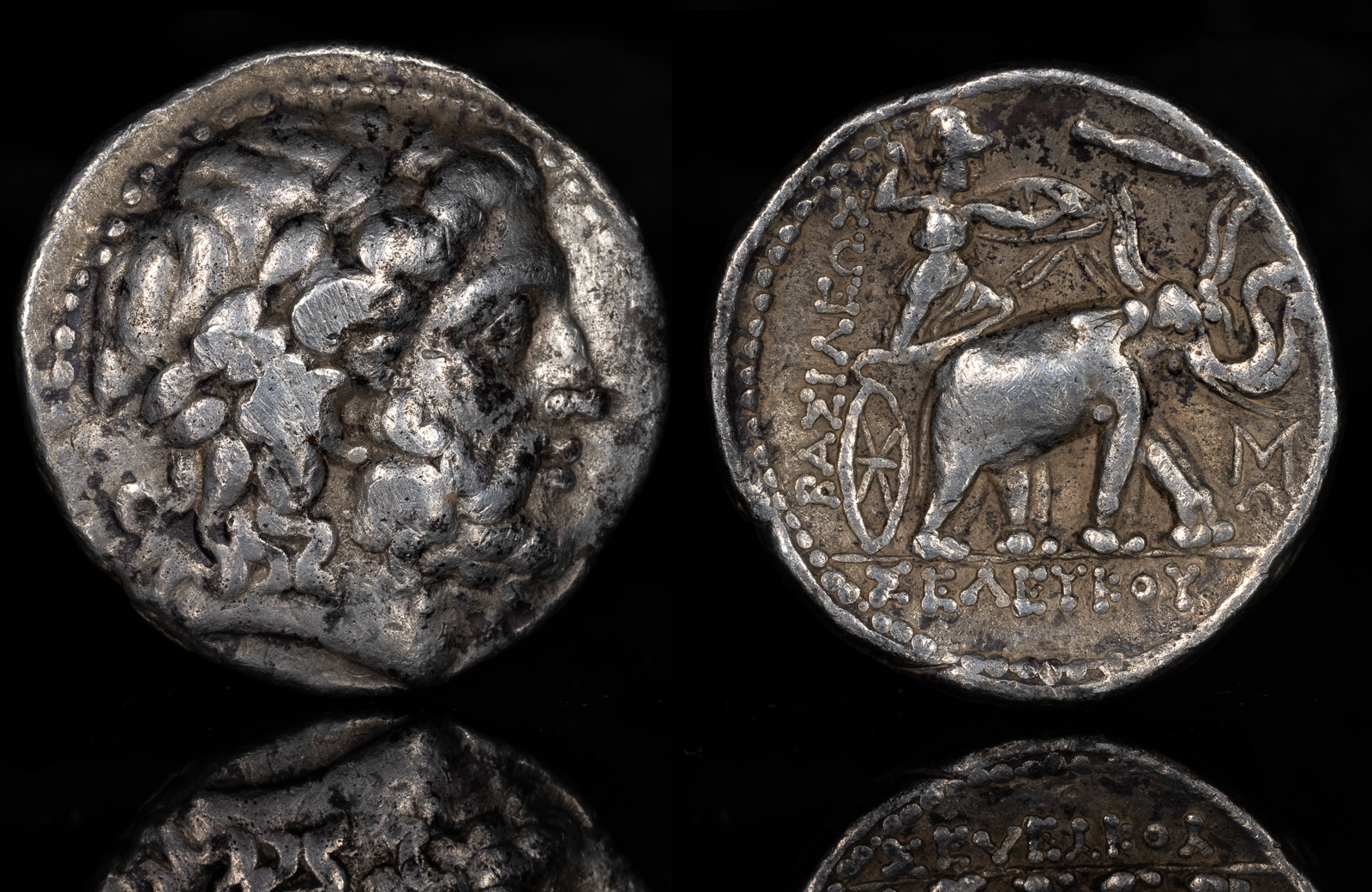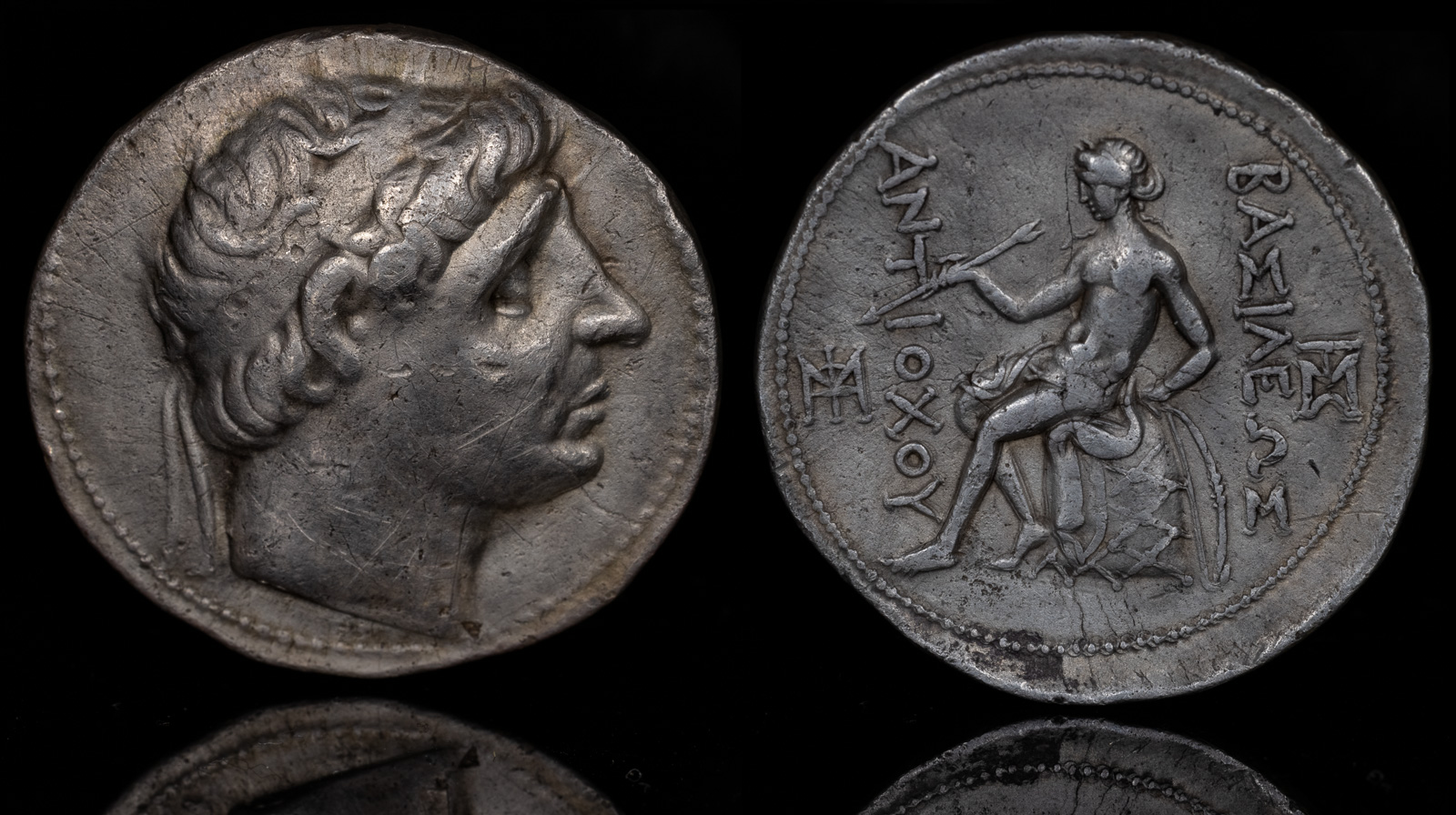
Seleukos I Nikator
Tetradrachm (Silver, 26 mm, 17.08 g, 8 h)
Susa, circa 296/5-281.
Laureate head of Zeus to right. Rev. BAΣIΛEΩΣ / ΣEΛEΥKOΥ Athena, brandishing spear overhead in her right hand and holding shield in her left, standing right in quadriga of elephants moving to right; above to right, spearhead; before elephants, monogram of MΩ. SC 177.2.
The Seleukid Kingdom was founded by Seleukos I Nikator and continued by his son Antiochos I Soter. It was the largest of the post-Alexander kingdoms, though over time they lost more and more territory to rebellious client kingdoms and invasions, until they were eventually defeated entirely and swallowed by Rome.

Seleukid Empire, Antiochos I Soter AR Tetradrachm
Seleukeia on the Tigris, 281-261 BC
Diademed head to right / Apollo Delphios seated to left on omphalos, testing arrow and resting left hand on grounded bow; ΒΑΣΙΛΕΩΣ to right, ΑΝΤΙΟΧΟΥ to left, monogram to outer left and right.
SC 379.5a; HGC 9, 128g. 16.80g, 29mm, 3h.
Orontes III is believed to found the Kingdom of Sophene, though it struggles for independence from the Seleukids.
Seleukos I Nikator gains control of Babylon, founding the Seleukid Empire and beginning Babylon’s decline as a center of power as Seleukos establishes Seleukeia on the Tigris.
Seleukos I Nikator proclaims himself king along with the other Diadochi, thus founding the Seleukid Kingdom.
Following the victory in the Battle of Ipsos, Cilicia comes under Seleukid control with Seleukos I Nikator. This included Aigai.Tarsos, Soloi, Issos, and Mallos.
Ariarathes II kills the Macedonian satrap and continues the Ariarathid dynasty, but is forced to accept Seleukid suzerainty.
Tralleis comes under Seleukid control.
May
Antioch founded by Seleukos I Nikator of the Seleukid dynasty.
Birth of Antiochos II Theos to Stratonike and Antiochos I Soter.
Lysimachos defeated at the Battle of Coropedion. Adramytteion, Ainos, and Abydos come under control of the Seleukid Empire. Ephesos returns to its original name.
September
Seleukos I Nikator is murdered by Ptolemy Keraunos while praying. Antiochos I Soter becomes king of the Seleukid Empire.
The Gauls invade the Seleukid Empire under Antiochos I Soter.
June 2
Death of Antiochos I Soter. Antiochos II Theos becomes king of the Seleukid Empire.
Approximate foundation of Laodikeia ad Lycon by Antiochos II in honor of his wife, Laodike.
Arados removes its royalty and becomes a free city in the Seleukid Empire.
258 BCE
Antiochos II Theos of the Seleukid Empire fights the Second Syrian War against Ptolemy II Philadelphos of Egypt. Arados takes the side of Antiochos.
Antiochos II signs an agreement with Antigonos II against Ptolemy II and the Second Syrian War begins.
Miletos is taken by Antiochos II Theos and its tyrant Timarchos is killed. The rebellion with Ptolemy Epigonos against Ptolemy II Philadelphos ends.
The Second Syrian War ends. Ptolemy II cedes land to Antiiochos II and Antigonos II remains in mastery of Greece. Antiochos II takes control over Ephesos, Samos, and Miletos.
The navy of Ptolemy II Philadelphos is defeated by Antiochos II Theos at Ephesos.
Antiochos II Theos marries Berenike, the daughter of Ptolemy II Philadelphos.
Diodotos I, the Seleukid satrap of Baktria, declares independence from the Seleukid Empire, establishing the Greco-Baktrian Kingdom.
Antiochos III besieges Kypsela until the locals join his army.
July
Antiochos II Theos dies, potentially by poisoning. Seleukos II Kallinikos becomes King of the Seleukid Empire.
Andragoras declares his independence from the Seleukid King Seleukos II.
Antioch becomes the capital of the Seleukid Empire.
Arsames I supports Antiochos Hierax over his brother Seleukos II Kallinikos for the Seleukid throne.
December
Seleukos II Kallinikos dies after falling from his horse. Seleukos III Keraunos becomes king of the Seleukid Empire.
June
Seleukos III Keraunos is assassinated by members of his own army. Antiochos III the Great becomes king of the Seleukid Empire.
Achaios declares himself king of the region including Laodikeia ad Lykon.
Antiochos III recaptures Seleukeia Pieria.
Antiochos III besieges Sardis but fails to take its akropolis.
Achaios, who ruled over the territory including Laodikeia ad Lykon, is defeated by Antiochos III.
Antiochos III transports 2000 Jewish families from Babylon to Laodikeia ad Lykon.
Antiochos III defeats Xerxes of Sophene, then marries him to his sister, who assassinates Xerxes. Zariadres is installed in Sophene.
Antiochos III of the Seleukid Empire campaigns in Baktria but eventually agrees to a peace with Euthydemos I, the Greco-Baktrian king, recognizing the kingdom’s independence.
Nagidos and the rest of Cilicia come under Seleukid control.
Lycia, including Phaselis, is overrun by Antiochos III.
Antiochos III rebuilds Lysimachia.
Sestos surrenders to Antiochos III.
Antiochos III, desiring to meet Rome in battle, is detained by the cities of Alexandria Troas, Smyrna, and Lampsakos, which refused entreaties.
Chalkis used as a base by Antiochos III for invading Greece.
Metropolis and Kierion are taken by Antiochos III in the Roman-Seleukid War.
Antiochos III refortifies Sestos in preparation for a Roman attack.
Antiochos III orders the inhabitants of Lysimachia to abandon their city.
Death of Autophradates I of Persis, who demonstrated increasing independence from the Seleukid Empire. Ardaxšir II becomes king.
Antiochos III the Great is killed while pillaging at temple of Bel at Elymais. Seleukos IV Philopator rules the Seleukid Kingdom.
September 3
Seleukos IV Philopator is killed by a bureaucratic Helidoros. Antiochos becomes king of the Seleukid Kingdom.
Death of Antiochos of the Seleukid Kingdom. Antiochos IV becomes king.
During the Maccabean Revolt against the Seleukids, tensions increase between the Jewish population and Idumeans, who are caught between the Seleukids and the Hasmoneans.
Death of Mattathias, who started the Maccabean Revolt of Judea against the Seleukid Empire. Judas Maccabee continues the revolt.
November
Antiochos IV dies at Isfahan while on the way home from an unsuccessful campaign. Antiochos V Eupator becomes king of the Seleukid Kingdom.
Antiochos V Eupator is put to death. Demetrios I Soter becomes king of the Seleukid Kingdom.
Alexander Balas gives Tyre the right to asylum.
June
Demetrios I is killed by Alexander Balas, who becomes the Seleukid king.
Susa breaks free from the Seleukid Empire.
August
Alexander Balas is defeated by Ptolemy VI and Demetrios II, who becomes the Seleukid king.
Jonathan is killed by Diodotos Tryphon. His brother Simon continues the Hasmonean Dynasty.
Hyspaosines declares independence from the Seleukids and founds the Characene Kingdom.
Diodotos Tryphon is either killed or commits suicide. Antiochos VII Euergetes takes the Seleukid throne.
July
Demetrios II Nikator is taken prisoner by the Parthians. Diodotos Tryphon becomes the Seleukid king.
Antiochos VII Euergetes is killed in the Battle of Ekbatana by Phraates II. Demetrios II Nikator retakes the Seleukid throne.
Demetrios II Nikator is defeated at the Battle of Damaskos by Alexander II Zabinas. He is then captured and killed on a ship near Tyre. Alexander II takes the Seleukid throne.
Tyre obtains its independence from the Seleukids.
Alexander II Zabinas is defeated and killed by Antiochos VIII, who takes the Seleukid throne.
Antiochos VIII Grypos is killed by his minister Heraklaion. His brother Antiochos IX becomes the Seleukid king.
Antiochos IX Kyzikos is killed by Seleukos VI, who becomes the Seleukid king.
Seleukos VI Ephiphanes, a Seleukid king, is killed during riots.